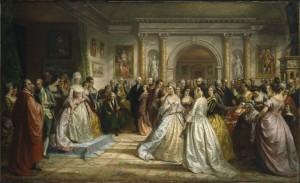Chapter ten, Society: Aspirations and Achievements, covers the life and times of the early aristocracy. Throughout its history, the colony’s debt to England in all areas is evident—society, government, art, and architecture. The wealthy planters came from England, and considered themselves English in many respects.
Early settlers often came with the intention of returning to England—that is, coming to the colony for money, not a future. Many families did away with the entail system popular in England, partially due to land being a commodity rather than a future for their children. Instead, land and other inheritances would be split among the children, both male and female. Women were now economic entities of their own. Weir asserts that they “occupied essential economic roles, were frequently well informed about financial matters, and enjoyed reasonably high status” (230). Still, the overall status of women in the seventeenth and eighteenth centuries remained subdued.
High death rates also affected life in colonial South Carolina. High infant mortality rates may have led to “low emotional investment in children” (Weir 234). Parental death was also a huge obstacle. Unlike New English children, who stayed with their parents into adulthood, Charlestonian children often inherited their estates as soon as they came of age, and sometimes sooner. Widows and widowers often remarried and the tangled web of lineage is a nightmare for modern genealogists.
Complicated family ties also contributed to a system that hardly resembles the “good ole boy” system the South is known for. Instead, because many people in the local government were related in one way or the other, people were judged on their “personal qualities such as abilities and compatibility” to “assume more important roles” (Weir 236). After the Revolution, this system changed to be based more on family ties.
The quick and easy wealth that the Charleston elite experienced was displayed proudly. Many visitors to the city, from its founding to the eve of the Revolution, noted how opulent and gay it was. Recent research shows that “South Carolinians spent proportionally about the same amount of their wealth on clothing and household furnishings as their counterparts elsewhere,” they were just considerably wealthier (Weir 237).
The Southern stereotypes developed during the colonial period. During the Southern months, the elite were known to spend their time drinking and playing cards. Even the governing bodies were thought to be lazy. One governing body went so far as to suspend their work to attend a round of balls. The flipside to this is the reputation for Southern hospitality. The colonial aristocracy was fluent in all social graces. They were also “punctual in paying debts” and, perhaps paradoxically, extremely hardworking (Weir 261). Weir notes that with such industrious work for most of the year, it is not so surprising that a legislative body would suspend their session to attend a few balls.
The Charles Towne colony was run by an aristocracy that did its best to serve the people. Although they still called England home, by the end eighteenth century, many considered Charles Towne their country.

Comments are closed.